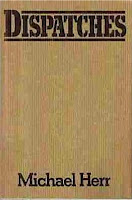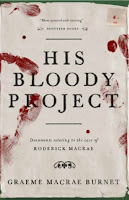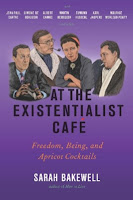2016 has certainly been an interesting year. For now let's forget politics, economics, and world events, and instead, let's focus on books! This month we asked staff across all library departments to share their favorite reads of 2016. Their selections didn’t have to be new books (although some are); each just had to be “the" book.
As with any group, our tastes are diverse, but each featured book made a strong impact on its reviewer. Some of the year’s best are fiction, some nonfiction, some are children’s books or graphic novels. A few of us absorbed our stories via audio. Altogether we read a whole lot of books and here are our best of the year!
Mike May, Adult Services
Dispatches by Michael Herr
The best book I “read” in 2016 was the digital audiobook version of
Dispatches by Michael Herr, which vividly describes the author's experiences as a war correspondent in Vietnam. The print edition was originally published in 1977, but I hadn’t heard about it until the author died this year. Herr’s depictions of combat are as surreal and disturbing as they must have been 40 years ago, especially when told in narrator Ray Porter’s compelling voice.
His Bloody Project by Graeme Macrae Burnet
I also really enjoyed
His Bloody Project by Graeme Macrae Burnet, a new historical thriller set in 1869 about a 17-year-old Scottish crofter who commits a brutal triple murder in a remote Highland village. Shortlisted for the 2016 Man Booker Prize, this fictional crime story is revealed through police statements, medical reports, newspaper articles, court transcripts, and the killer’s own confession.
Rachel Boeke, Technical Services
Braiding Sweetgrass: The Wisdom of Plants by Robin Wall Kimmerer
This collection of essays contains the author's observations about the natural world and humanity, informed by her identity as a biology professor, a member of the Potawatomi tribe, and a mother. Stories such as the impoverished childhood of Kimmerer's grandfather, the sex lives of mushrooms, and an abandoned Christmas dinner are at once educational, humorous, and heartbreaking. Each essay stands alone, but the book as a whole is wonderfully engaging and leaves readers curious, grateful, and inspired to find connection with the earth - and with each other - at any time of year.
Laura Feyen, Technical Services
The Book Thief by Markus Zusak
I enjoyed
The Book Thief by Markus Zusak. It is about an orphaned girl in WWII Germany and her adoptive family, who hide a Jew in their basement. It is an interesting slice of life of civilian Germans in this time period.
Ryan Bankson, Circulation Services
The Picture of Dorian Gray by Oscar Wilde
Would you sell your soul for eternal youth? Mr. Dorian Gray makes just such an arrangement, but the consequences end up being more than he bargained for.
Danielle Day, Youth Services
Nanette’s Baguette by Mo Willems
Funny account of Nanette’s first big solo adventure to buy a baguette at the bakery. She travels alone and faces many distractions along the way as she meets and greets Georgette, Suzette, Bret with his clarinet, Mr. Barnett and his pet, Antoinette. But she remembers her mission and buys the baguette from Juliette the baker. The baguette is a wonderful large, warm, aromatic hunk of bread, so Nanette takes a taste and another and more--until there is nothing left. In rhyming pose her mother, whose hug is as warm and wonderful as a million baguettes, understands her and says, “The day's not over yet, Nanette. Let's reset.”
This Book is Not About Dragons by Shelley Moore Thomas
Nope! Absolutely not! No Dragons here! Told by a mouse who insists that this book contains absolutely no dragons, not even a claw nor a flame nor any large, pointy scales. The pictures tell a different story. Readers will know better and enjoy being in on the jokes as flock of dragons chase the mouse to the very end of the book within the book. Suspense builds humorously as the energetic text insists there are no dragons in this book, leading to a clever, unexpected ending. Clever artwork by Fred Koehler provides fun scenes to linger on and details to discover over multiple readings. If you like the Monster at the End of This Book – you will read this book over and over again.
Sharon Daly, Youth Services
The Nightingale by Kristin Hannah
Historical fiction that takes place in 1939 France. Vianne and Isabelle are sisters separated by age and experience, both trying to cope with the occupation of France by the Germans.
Vianne must say goodbye to her husband who is heading to the front lines. Isabelle, eighteen years younger, is headstrong and rebellious and joins the Resistance after being betrayed by her French boyfriend. Both sisters are trying to survive and fight the war in their own ways, all the while attesting to the resiliency and strength of women. As a person who enjoys historical fiction, I was not disappointed by this book, which proves how strong the human spirit can be in the most adverse situations.
Abbey Holt, Technical Services
Bottomland by Michelle Hoover
When two girls disappear from their home in rural Iowa shortly after World War I, their German-American family struggles to solve the mystery while also facing hostility from neighbors due to their heritage. The characters’ German background drew me to the story because it mirrors that of my own great-grandparents, and the mystery woven through the novel kept me intrigued until the end.
Thea Dement, Circulation Services
The Invisible Library by Genevieve Cogman
My favorite book of 2016 was
The Invisible Library by Genevieve Cogman. This book is a mixture of fantasy, science-fiction, steampunk, and adventure. Irene is a librarian for The Library, an organization that gathers unique books from different worlds in order to maintain the balance between good and chaos. Irene gets sent to an alternate-reality London with her new assistant Kai to retrieve a dangerous book but gets dragged into a plot far more complicated than it first appears. They discover many other evil forces are looking to nab the book for themselves. To make matters worse, the world they are in is aligned with chaos, making magic and dangerous creatures like werewolves, vampires, and fae commonplace. Sound interesting? This is only the first book in the series - the second is just as fantastic and the third is coming out in January.
Rebecca Leifker, Technical Services
The Art of Holding On and Letting Go by Kristin Bartley Lenz
A coming-of-age story about a young woman who has spent her whole life traveling the world mountaineering with her parents and uncle. While competing in a rock-climbing event in Ecuador tragedy strikes, sending her whole life off course and her packing off to the mountainless landscape of Detroit. Cara must now find out who she is without the mountains and nature to guide her.
Ben Eagle, Adult Services
A Reliable Wife by Robert Goolrick
This unconventional, literary suspense novel is set in the Midwest in the early 1900s. The descriptions of the cold Wisconsin winter were both lyrical and bleak. The story moves from a desolate small town in the winter to the livelier and more seductive St. Louis. Psychological games between a wealthy male widower and his mail-order bride make up the meat of this book. Both characters have been severely damaged in the past and are secretly using each other for their own purposes. This dark tale shows the madness that can brew up in long winters and isolation.
At the Existentialist Café by Sarah Bakewell
Bakewell traces the lives of the early 20th century philosophers most associated with the movement of existentialism. She gives mostly a historical account, but describes each person’s philosophy enough to show the importance they had on our conception of the world. Her writing style and tendency to tie in the influence these people personally had on her make this anything but a dry treatise. I often gravitate toward books about the early 20th century; this book takes the reader through the years leading up to WWII and the aftermath of the war. She talks about the effects the war had on these individuals, how it affected their mindset, and how they lived-out their philosophy (or failed to in some cases). In a time of hard determinism taking root in the scientific and philosophical community, her argument that as a culture we need to reexamine these titans’ work on personal freedom and authenticity is especially persuasive.
Angie Johnson, Adult Services
An Ember in the Ashes by Sabaa Tahir
Set in a lush, desert world reminiscent of ancient Rome with rich flavors of the Middle East, our two main characters Laia and Elias lead very different lives. Laia is an orphaned girl helping her grandparents sell goods at market. Her life is overturned when militants invade her home and destroy the only life she has known. Elias is a military trainee, days away from graduating and becoming a "Mask." Masks are enforcers who engage in violence and destruction, though Elias feels he doesn't fit in. Just when he is deciding that he might take his future into his own hands, a mysterious and powerful force requires Elias to engage in the battle of his life. Is he warring for honor, for some nefarious purpose, or his very survival? Meanwhile, Laia finds herself embroiled in dark secrets of the empire and those who might rebel against them. She soon realizes she holds more strength (and power) within herself than she ever knew. When these secrets and powers collide, will she end up standing up against or with Elias in the end?
A sequel called
A Torch Against the Night was just released this fall. Spectacular and just as good as the first book. I believe it is going to be a series.
Michelle Oberhoffer, Circulation
Services
News of the World by Paulette Jiles
News Of The World by Paulette Jiles is a sweet and salty book that I really enjoyed. The setting is the Western United States, post Civil War. A ten-year-old girl who had been kidnapped by Indians and who no longer even remembers how to speak English is rescued and placed in the care of an elderly gentleman who is to deliver her to her remaining family. As they journey through Kansas to Texas, they are confronted with several harrowing experiences, but learn to trust and eventually love each other. Watching the main characters grow and develop a relationship neither of them expected made for a very satisfying read.
Alanda Gregory, Circulation Services
People of The Lie: The Hope for Healing Human Evil by M. Scott Peck, M.D.
I first read this book over 10 years ago. I've read it again this year because self-improvement is always necessary. This book has allowed me to learn and grow in a way that has helped heal many areas of my life.
This book takes an in-depth look at how our negativity and self-pain can affect our children and loved ones without our even realizing it. Dr. Peck gives examples of cases that he's encountered over years in his practice and how families were affected by very subtle hints of abusive behavior. What one may consider normal, others may look at as unacceptable and downright malicious in nature. However, the many parents, spouses and friends in these cases were oblivious to the "evil" that impacted the individuals they were related to or in relationships with.
I recommend this book to coaches, psychologists, or anyone looking for insight on how to help heal broken communications, broken hearts, and broken relationships. In order to even begin down that path, the reader must acknowledge that healing is welcomed. Dr. M. Scott Peck is a great writer and gives amazing perspectives that aren't just clinical answers to psychological problems.
If you like this book, may I recommend these other books by Dr. Peck:
A Road Less Traveled
In Heaven As on Earth
The Different Drum
Mark Bowers, Circulation Services
Geography is a force to be reckoned with and cannot be ignored when analyzing present conflicts and historical events. The geographic layout of the land has and will continue to directly affect the outcome of wars, the accumulation of wealth, and the general success of a country. Robert Kaplan uses geographic detail to explain why Afghanistan is the graveyard of empires, why the Syrian conflict is a proxy war between Saudi Arabia and Iran, and why Russia is always meddling in Eastern Europe. The book also utilizes geography to explain the historical power of the British Empire, the rise of China, and the geopolitical dominance of the United States. Kaplan’s book encourages the reader to look at the world map with a new perspective and the book gives a greater insight into why countries have succeeded and failed on the world stage.
Sarah Smith, Adult Services
Binti by Nnedi Okorafor
I spent a very satisfying afternoon with this novella,
which won both the Nebula and Hugo this year. Okorafor packs an impressive
amount of character development and world-building into 96 pages. I'm absolutely
looking forward to reading the next title in the series!
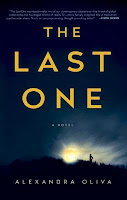
The Last One by Alexandra Oliva
The Last One will be near the top of my Best of list for 2016 for the way that Oliva mixes literary introspection, sharp human observation, and a suspenseful action plot. This is a fully absorbing weekend read that stuck with me even after I finished the last page, and I highly recommend it to anyone who enjoys a gripping tale of survival.
For more detail, here's my full review from earlier this year.
Ann Harris, Adult Services
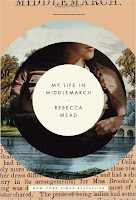 My Life in Middlemarch by Rebecca Mead
My
Life in Middlemarch
is a nonfiction hybrid: one part memoir and four parts literary biography, it
tells the evolving story of author Rebecca Mead’s lifelong relationship with
the Victorian novel Middlemarch, George Eliot’s masterpiece. Mead first encountered (and fell in love with) Middlemarch as a teen. She re-reads the hefty novel several times over the years, finding that different characters and plot elements resonate as she launches a career, marries, and raises step-children. The novel grows as she grows.
My Life in Middlemarch by Rebecca Mead
My
Life in Middlemarch
is a nonfiction hybrid: one part memoir and four parts literary biography, it
tells the evolving story of author Rebecca Mead’s lifelong relationship with
the Victorian novel Middlemarch, George Eliot’s masterpiece. Mead first encountered (and fell in love with) Middlemarch as a teen. She re-reads the hefty novel several times over the years, finding that different characters and plot elements resonate as she launches a career, marries, and raises step-children. The novel grows as she grows.
Eliot, as an author, is known for her intelligence, warmth, and remarkable psychological acuity and she has found a worthy fan in Rebecca Mead.



















